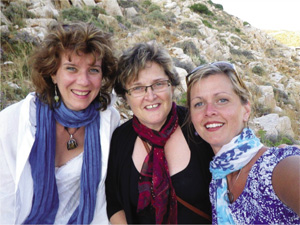
From left: Helen, Grace and Jen, summer 2011
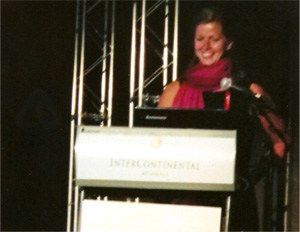
Jen
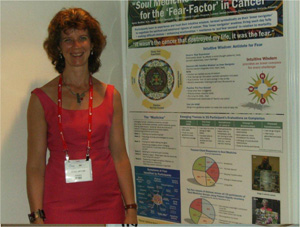
Helen
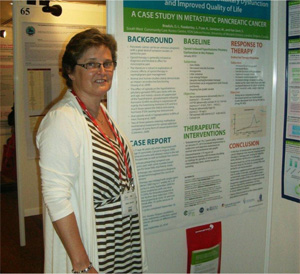
Grace
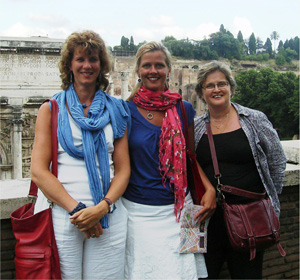
From left: Helen, Jen and Grace, Italy

Shadows of the three authors on the Island of Sifnos
Multinational Association of Supportive Care in Care Annual Symposium
Athens, Greece
June 23-25, 2011
Just Stay is written from three very different perspectives from three very different women. It was after the first draft had been written, the three of us decided that what we had collectively experienced was worth sharing.
In early Spring 2011, we decided to each submit abstracts to the Multinational Association for Supportive Care in Cancer Annual Symposium. The fact that the conference was in Athens Greece was a great incentive! We each wrote an abstract related to our individual experiences with the journey we had all taken with Rob, but each from our own perspective.
Please see submissions below and pictures of us “working” at the conference.
Jen won a “Young Investigator Award” for her oral presentation entitled:
Electronic Palliative Care for a Community Cancer Client
The Impact of Real Time Caregiver Support
Objectives:
A case-study demonstrating significant enhancement of care using real time electronic (“Blackberry”) interaction between client & primary caregiver with their palliative care team.
Methods:
Retrospective case-study of a palliative care community client & their primary caregiver with the use of a secure blackberry device. This allowed for real time communication between the primary caregiver and their palliative care team: Nurse Practitioner, Spiritual Care Specialist, Palliative Care Physician, Oncologist, and others. Documentation of this electronic communication allowed for a retrospective study of the significant enhancement of care provided by the Primary Caregiver, Nurse Practitioner and the Spiritual Care Specialist. This review highlights three phases that were enhanced during the client's disease trajectory:
- diagnosis and development of the treatment plan
- supporting optimal function and stability during palliative living
- responsive support and direction at the bedside during the decline to death
Results:
- Hospital avoidance
- Responsive pain and symptom management
- Coaching and counseling for self-management of complex disease processes
- 360 degree, “wrap-around” medical and supportive care interaction
- Prevention of primary caregiver burnout
- Time sensitive individualized care planning
- Real time electronic primary caregiver support at the death bed in the home
Conclusions:
Far from burdening the health care team this case-study demonstrates the clinical efficacy of electronic communication in palliative community based care. In addition to clinical impact there was also enhancement of client and primary caregiver well-being during palliative living and at end-of-life.
Helen Butlin-Battler's poster entitled:
A Pilot Study of “Soul Medicine”: Targeted Therapy for the ‘Fear-Factor’ in Cancer
Objectives:
To explore how spiritual, non-religious, wisdom and practices might become a ‘targeted therapy’ for the experience of fear while living with a cancer diagnosis.
Methods:
A six week group program of 1.5 hour sessions was developed for women undergoing treatment or were in surveillance. 6 groups were completed with participant numbers ranging from 4 – 7 totaling 25 participants. The group process used a combination of structured exercises and spontaneous sharing. Modalities targeted different learning styles and ‘left’ and ‘right’ brain approaches: diad sharing, group sharing, somatic awareness, various meditation practices, creative process through collaging, readings, poetry, music and image. Harvey Chochinov's Patient Dignity Inventory was used as a marker for beginning and end reports of their well being.
Results:
Participants reported significant benefits: greater peace with mortality, less anxiety about the future and less need to control it, more able to be with their ‘what is,’ greater capacity to tolerate difficult feelings/situations, greater connectedness with their higher power/life/ self/relationships. Those diagnosed with metastasis during or after the group reported using the strategies and wisdom to assist with coping significantly better than they expected.
Conclusions:
These pilot groups demonstrated positive benefits in integrating spirituality and practices into treatment. It indicates the need for further research measuring well-being and also on prognostic outcomes. Spiritual practices/wisdom harbor under-researched potential as a ‘targeted therapy’ embedded into treatment for the existential/spiritual rigors of a cancer diagnosis.
Grace Bradish's poster entitled:
Opioid Induced Hypothalmic Pituitary Dysfunction and Improved Quality of Life: A Case Study In Metastatic Pancreatic Cancer
Objectives:
- To outline the role of endocrine dysfunction in patients using opioids for the treatment of cancer related pain.
- To demonstrate the efficacious role of exogenous endocrine support (Testosterone and Corticosteroid) as part of a palliative treatment plan
Methods:
A retrospective case study detailing the experience of a 46 year old man (Mr. F) with metastatic pancreatic cancer will be presented. Details regarding his clinical presentation, laboratory findings, and the benefits realized will be discussed. A descriptive review of the literature outlining the effects of opioid induced impaired endocrine function and the benefits of testosterone and corticosteroid replacement will be presented.
Results:
The literature is very convincing regarding hypogonadism caused by chronic opioid therapy. There is however, a dearth of literature substantiating this in the cancer patient population, particularly regarding the clinical effect of treatment. This one case study demonstrates clearly the major benefits that may be derived from endocrine replacement toward improving Quality of Life. Mr. F experienced:
- Increased activity tolerance
- Increased social engagement
- Improved nausea control
- Decreased opioid requirement
- Improved libido and sexual function
- Full independent mobility up until his last 10 days of life
Conclusions:
Clearly this ‘N of one study’ is compelling for further studies on the frequency, severity and effect of hormone replacement for hypogonadism and adrenal insufficiency in patients receiving opioids for cancer related pain.